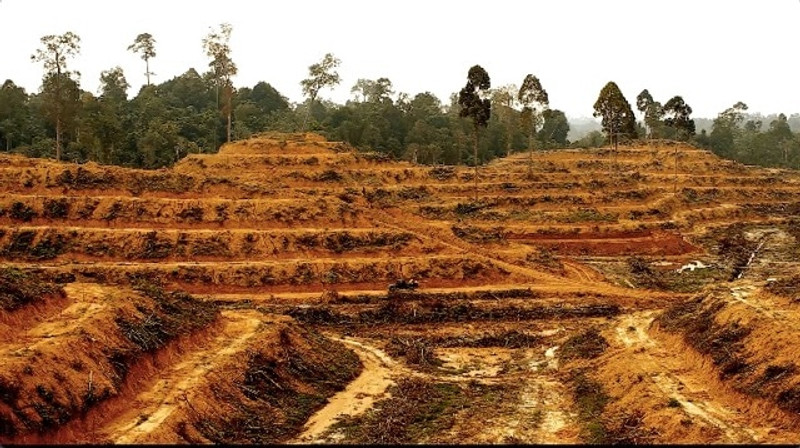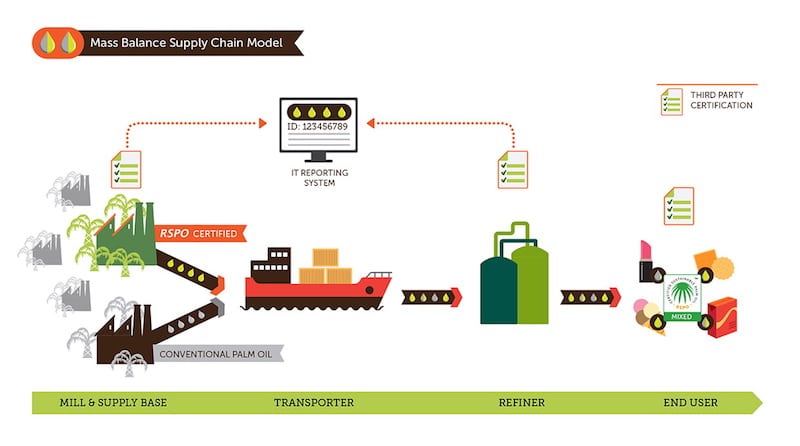
Important Updates on Sustainability and Palm Oil
Published by Anne Altor on Mar 8th 2019
In this post, we discuss RSPO sustainability certifications for palm oil.
If you're not familiar with palm oil, check out our introductory post about it from 2015!
Sustainability certifications abound for palm oil. We're here to help sort them out!
Rigorous standards are critical to reduce the massive deforestation and peatland draining that are raging through Indonesia and Malaysia. The dominant palm oil certification body is the Roundtable on Sustainable Palm Oil (RSPO). This post focuses on RSPO certifications. The RSPO offers the following certifications for palm oil:
- "Identity Preserved (IP):" RSPO's strictest certification. IP palm oil must be traceable back to the plantation it came from (which must be RSPO certified). IP certification does NOT guarantee that the plantation the palm oil came from is deforestation-free, as the rest of this post will explain.
- "Segregated": Segregated palm oil can be sourced from multiple plantations, but all must have RSPO certification. In other words, segregated RSPO palm oil must not be mixed with uncertified palm oil during processing.
- "Mass Balance:" RSPO certified palm oil is mixed with uncertified (conventional) palm oil. A consumer company purchases a certain amount of RSPO certified palm oil, which in theory relates to physical product somewhere in the supply chain. However, the palm oil they get out of the system can be 100% uncertified (see image below). Therefore, a product labeled as "Mass balance sustainable palm oil" could contain zero sustainable palm oil and 100% conflict product.
- "GreenPalm", "Book and Claim", or "PalmTrace." Under these systems, companies can continue deforestation and business as usual. They can buy RSPO certification in the form of credits, which in theory go to support more sustainable practices elsewhere in the palm oil industry.
- Important note: RSPO certification does not require organic agriculture practices, and toxic chemicals are routinely used on RSPO-certified plantations.

RSPO adopts new standards
In November 2018, the RSPO adopted stronger standards for "No Deforestation, No Peat, and No Exploitation" of human rights (NDPE). Before this, the RSPO allowed certified companies to continue logging secondary forest and draining peatlands. Still, loopholes remain that may allow deforestation to continue on RSPO-certified plantations.
These revised standards take an important step toward creating meaningful sustainability standards for palm oil production among RSPO-certified companies. However, many studies and investigations have shown that the RSPO has struggled to monitor and enforce its existing standards (EIA, 2015; IDDRI, 2017). Because of its poor track record on monitoring certified plantations, The Palm Oil Innovation Group (POIG) and others question how the RSPO will effectively enforce these stricter standards.
In a recent study of the effects of RSPO certification on deforestation in Indonesia, Carlson et al (2017) report that certification reduced deforestation by about 35%. Deforestation in RSPO-certified plantations continued at a rate of about 6.6% of remaining forest/year, compared to an average rate of 9.8% of remaining forest/year on uncertified (conventional) plantations. That means a huge amount of forest loss continues on RSPO-certified plantaions.
Consumers need to recognize the limitations
of all RSPO certifications currently available. The PalmTrace and Mass Balance Sustainable certifications absolve companies of meaningful responsibility for change. However, the "Identity Preserved" and "Segregated" standards are at least on the right track, but consumers and companies should be aware that RSPO certification does not guarantee deforestation- and conflict-free palm oil.
Recommendations for improving the RSPO
The Palm Oil Innovation Group is working to improve sustainability in the palm oil industry by requiring its members to commit to more rigorous standards than those required by the RSPO. Others have chimed in as well. In a 2018 report, the Changing Markets Foundation defined important ways in which the RSPO can strengthen its impact:
? Focus on quality rather than quantity of certification.
? Ensure that there are opportunities for small and medium-sized palm producers to obtain sustainability certification, which is currently out of reach for many of them, due in part to cost.
? Improve monitoring of RSPO-certified companies, ensure transparency and third-party verification of this process, and ensure that violations are addressed in a meaningful way.
? Eliminate the Mass Balance and GreenPalm/PalmTrace certifications, which disconnect sustainability claims from physical product and promote greenwashing. These schemes enable deforestation-based companies to continue with business as usual while promoting themselves as RSPO certified.
? In addition, private companies that purchase palm oil must demand meaningful options, provide transparency into their supply chains, conduct independent audits of their suppliers, and suspend business with any that are in violation of sustainability and human rights standards.
? At the national level, importing countries should establish policy requiring environmental and social responsibility criteria to be met in order to gain access to their markets.
Are there other options?
Given the problems and limitations described above, we choose not to use palm oil in our products. However, for companies that want to use palm oil and don't need massive amounts of it, Palm Done Right might be worth looking at:
Palm Done Right was founded in 2008 by Natural Habitats to provide organic, Fair-Trade, socially and environmentally responsible palm oil. Palm Done Right works with more than 100 small farmers in Ecuador (average size farm of 30 hectares) and with 1400 small farmers in Sierra Leone (average farm size of 3 hectares). Although their work is important, compared to the plantation sizes of up to 20,000 hectares in Indonesia and Malaysia where 86% of global palm oil is produced (IDDRI, 2017), Palm Done Right produces a tiny fraction of the global palm oil supply. To stop palm oil-based deforestation, we need strong sustainability standards among the larger palm oil producers. To get there, we need the large consumer companies (e.g., Utz, Unilever, Pepsi) to demand true and meaningful sustainability. And we need consumers to step up and start voting loudly for the planet with their dollars.

